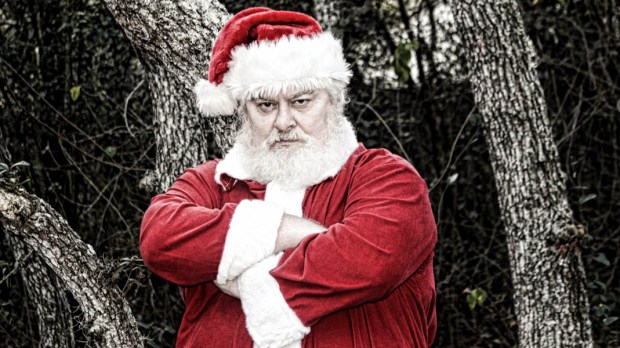I know that the Santa or not debate tends to bring out, shall we say, not the merriest holiday spirit in people, and I also know that every family’s different. If you do Santa, do Santa. He’s not dangerous, and he’s a myth, which is quite different than a lie. And obviously, my way isn’t the one right way to celebrate Christmas. That being said, I’m definitively choosing not to make Santa Claus a part of my family’s Christmas tradition, and it has to do with what the feast day has done for me, through the years.
Everything I know about God and my faith I’ve learned primarily through the liturgical year. I could have learned in a classroom what Jesus did and why he came, but it’s no substitute for living through the stories the way we do through the year. We fast with Jesus during Lent, and remember that he is human, and that he got hungry too. We wait with him on Holy Thursday, we leave our tabernacles empty on Good Friday, and we celebrate his resurrection as if it were new: “Jesus Christ has risen today!” The liturgical year makes events of the past eternally present to us, so that we can immerse ourselves in them.
Christmas is no exception. The whole truth of what God’s incarnation actually means is there, written into the feast. The littleness of Christ, his humility and dependence, his desire to meet us as we are, so much so that he would take on our own human nature — I first encountered this aspect of God in the Christmas carols we sing, carols which tell the story over and over again, from every angle — through the eyes of the shepherds, of the angels, of the wise men, of Mary and Joseph, and of every other person waiting for the Lord.
“How silently, how silently the wondrous gift is given,” we sing, teaching our children of God’s gentleness and humility. “And Heaven and nature sing,” we cry, celebrating how God elevated our own nature when he took it on. “Glory to God in the highest, and peace on Earth!” we proclaim, reminding us of God’s purpose in coming, and the healing he promises.
I don’t want to dilute that. It’s too important. Everything in the Christmas celebration, from the food, which speaks of our joy and gratitude, to the tree, the lights, the decorations, which tell us that this time is set apart from the rest of the year, to the presents, which create an atmosphere for children of anticipation, and remind us all of God’s own love and gift of self, to the music, which proclaims the good news in every possible way, coupled with every personal tradition we’ve brought with us through the years, which ties all our Christmases together in a continuity of nostalgia, joy, and hope for the future — all of it has a purpose. All of it draws us deeper into the knowledge of who God is.
But Santa? He doesn’t really fit. He seems like an imposition. He’s supposed to supply a spirit of magic, of wonder, and anticipation to children, to make the day stand out even more, and I’m sure he does. But the joy, the sense of the extraordinary, the delight and anticipation is already there, in a more profound and complete way than he could ever contribute to.
Santa doesn’t seem dangerous or deceptive, but he does strike me as extra. He sticks out — the one part of the celebration that has nothing in particular to say about God’s overwhelming, unspeakable love, nothing to say about our hope, which is justified by a God who would do so much for us, nothing even to say about God’s tremendous generosity. He’s just there, doing I don’t know what, being jolly, and magic, and fun. He’s redundant at best, and confusing at worst. Where does this figure fit into the purpose of the season?
Some people explain to their children that Santa is St. Nicholas, and tell the story of what the saint did. That explanation serves to salvage Santa, bringing him back into the religious narrative, where the saint’s original place in the season began. That version of Santa makes some sense (although he has his own feast, December 6, and doesn’t need Christmas too). But Santa’s typical persona, the jolly old man and his magical reindeer, the elves at the North Pole, the milk-and-cookies tradition, has nothing in common with the bishop himself.
Christmas is too whole, and much too important, to need anything so superfluous as that Santa.
Read a rebuttal to this piece, Why we will always do Santa at my house.

